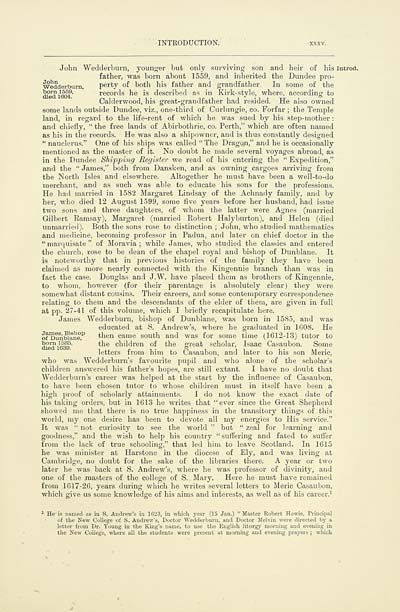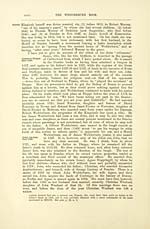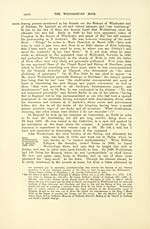Wedderburn book > History
(43) Page xxxv
Download files
Complete book:
Individual page:
Thumbnail gallery: Grid view | List view

INTKODUCTTONV
John Wedderburn, younger but only surviving son and heir of his introd.
father, was born about 1559, and inherited the Dundee pro-
wedderburn, perty of both his father and grandfather. In some of the
died 1604' records he is described as in Kirk-style, where, according to
Calderwood, his great-grandfather had resided. He also owned
some lands outside Dundee, viz., one-third of Curlungie, co. Forfar ; the Temple
land, in regard to the life-rent of which he was sued by his step-mother :
and chiefly, " the free lands of Abirbothrie, co. Perth," which are often named
as his in the records. He was also a shipowner, and is thus constantly designed
" nauclerus." One of his ships was called " The Dragon," and he is occasionally
mentioned as the master of it. No doubt he made several voyages abroad, as
in the Dundee Shipping Register we read of his entering the " Expedition,"
and the " James," both from Dansken, and as owning cargoes arriving from
the North Isles and elsewhere. Altogether he must have been a well-to-do
merchant, and as such was able to educate his sons for the professions.
He had married in 1582 Margaret Lindsay of the Achnady family, and by
her, who died 12 August 1599, some five years before her husband, had issue
two sons and three daughters, of whom the latter were Agnes (married
Gilbert Kamsay), Margaret (married Robert Halyburton), and Helen (died
unmarried). Both the sons rose to distinction ; John, who studied mathematics
and medicine, becoming professor in Padua, and later on chief doctor in the
"marquisate " of Moravia; while James, who studied the classics and entered
the chui-ch, rose to be dean of the chapel royal and bishop of Dunblane. It
is noteworthy that in previous histories of the family they have been
claimed as more nearly connected with the Kingennie branch than was in
fact the case. Douglas and J.W. have placed them as brothers of Kingennie,
to whom, however (for their parentage is absolutely clear) they were
somewhat distant cousins. Their careers, and some contemporary correspondence
relating to them and the descendants of the elder of them, are given in full
at pp. 27-41 of this volume, which I briefly recapitulate here.
James Wedderburn, bishop of Dunblane, was born in 1585, and was
educated at S. Andrew's, where he graduated in 1(308. He
of Dunblane^ then came south and was for some time (1612-13) tutor to
d? r di6 5 39' *^ e children °f the great scholar, Isaac Casaubon. Some
letters from him to Casaubon, and later to his son Meric,
who was Wedderburn's favourite pupil and who alone of the scholar's
children answered his father's hopes, are still extant. I have no doubt that
Wedderburn's career was helped at the start by the influence of Casaubon,
to have been chosen tutor to whose children must in itself have been a
high proof of scholarly attainments. I do not know the exact date of
his taking orders, but in 1613 he writes that "ever since the Great Shephei'd
showed me that there is no true happiness in the transitory things of this
world, my one desire has been to devote all my energies to His service."
It was " not curiosity to see the world " but " zeal for learning and
goodness," and the wish to help his country "suffering and fated to suffer
from the lack of true schooling," that led him to leave Scotland. In 1615
he was minister at Harstone in the diocese of Ely, and was living at
Cambridge, no doubt for the sake of the libraries there. A year or two
later he was back at S. Andrew's, where he was professor of divinity, and
one of the masters of the college of S. Mary. Here he must have remained
from 1617-26, years during which he writes several letters to Meric Casaubon,
which give us some knowledge of his aims and interests, as well as of his career. 1
1 He is named as in S. Andrew's in 1623, in which year (15 Jan.) "Master Robert Howie, Principal
of the New College of S. Andrew's, Doctor Wedderburn, and Doctor Melvin were directed by a
letter from Dr. Young in the King's name, to use the English liturgy morning and evening in
the New College, where all the students were present at morning and evening prayers ; which
John Wedderburn, younger but only surviving son and heir of his introd.
father, was born about 1559, and inherited the Dundee pro-
wedderburn, perty of both his father and grandfather. In some of the
died 1604' records he is described as in Kirk-style, where, according to
Calderwood, his great-grandfather had resided. He also owned
some lands outside Dundee, viz., one-third of Curlungie, co. Forfar ; the Temple
land, in regard to the life-rent of which he was sued by his step-mother :
and chiefly, " the free lands of Abirbothrie, co. Perth," which are often named
as his in the records. He was also a shipowner, and is thus constantly designed
" nauclerus." One of his ships was called " The Dragon," and he is occasionally
mentioned as the master of it. No doubt he made several voyages abroad, as
in the Dundee Shipping Register we read of his entering the " Expedition,"
and the " James," both from Dansken, and as owning cargoes arriving from
the North Isles and elsewhere. Altogether he must have been a well-to-do
merchant, and as such was able to educate his sons for the professions.
He had married in 1582 Margaret Lindsay of the Achnady family, and by
her, who died 12 August 1599, some five years before her husband, had issue
two sons and three daughters, of whom the latter were Agnes (married
Gilbert Kamsay), Margaret (married Robert Halyburton), and Helen (died
unmarried). Both the sons rose to distinction ; John, who studied mathematics
and medicine, becoming professor in Padua, and later on chief doctor in the
"marquisate " of Moravia; while James, who studied the classics and entered
the chui-ch, rose to be dean of the chapel royal and bishop of Dunblane. It
is noteworthy that in previous histories of the family they have been
claimed as more nearly connected with the Kingennie branch than was in
fact the case. Douglas and J.W. have placed them as brothers of Kingennie,
to whom, however (for their parentage is absolutely clear) they were
somewhat distant cousins. Their careers, and some contemporary correspondence
relating to them and the descendants of the elder of them, are given in full
at pp. 27-41 of this volume, which I briefly recapitulate here.
James Wedderburn, bishop of Dunblane, was born in 1585, and was
educated at S. Andrew's, where he graduated in 1(308. He
of Dunblane^ then came south and was for some time (1612-13) tutor to
d? r di6 5 39' *^ e children °f the great scholar, Isaac Casaubon. Some
letters from him to Casaubon, and later to his son Meric,
who was Wedderburn's favourite pupil and who alone of the scholar's
children answered his father's hopes, are still extant. I have no doubt that
Wedderburn's career was helped at the start by the influence of Casaubon,
to have been chosen tutor to whose children must in itself have been a
high proof of scholarly attainments. I do not know the exact date of
his taking orders, but in 1613 he writes that "ever since the Great Shephei'd
showed me that there is no true happiness in the transitory things of this
world, my one desire has been to devote all my energies to His service."
It was " not curiosity to see the world " but " zeal for learning and
goodness," and the wish to help his country "suffering and fated to suffer
from the lack of true schooling," that led him to leave Scotland. In 1615
he was minister at Harstone in the diocese of Ely, and was living at
Cambridge, no doubt for the sake of the libraries there. A year or two
later he was back at S. Andrew's, where he was professor of divinity, and
one of the masters of the college of S. Mary. Here he must have remained
from 1617-26, years during which he writes several letters to Meric Casaubon,
which give us some knowledge of his aims and interests, as well as of his career. 1
1 He is named as in S. Andrew's in 1623, in which year (15 Jan.) "Master Robert Howie, Principal
of the New College of S. Andrew's, Doctor Wedderburn, and Doctor Melvin were directed by a
letter from Dr. Young in the King's name, to use the English liturgy morning and evening in
the New College, where all the students were present at morning and evening prayers ; which
Set display mode to:
![]() Universal Viewer |
Universal Viewer | ![]() Mirador |
Large image | Transcription
Mirador |
Large image | Transcription
Images and transcriptions on this page, including medium image downloads, may be used under the Creative Commons Attribution 4.0 International Licence unless otherwise stated. ![]()
| Histories of Scottish families > Wedderburn book > History > (43) Page xxxv |
|---|
| Permanent URL | https://digital.nls.uk/95651235 |
|---|
| Attribution and copyright: |
|
|---|---|
| Description | A selection of almost 400 printed items relating to the history of Scottish families, mostly dating from the 19th and early 20th centuries. Includes memoirs, genealogies and clan histories, with a few produced by emigrant families. The earliest family history goes back to AD 916. |
|---|

